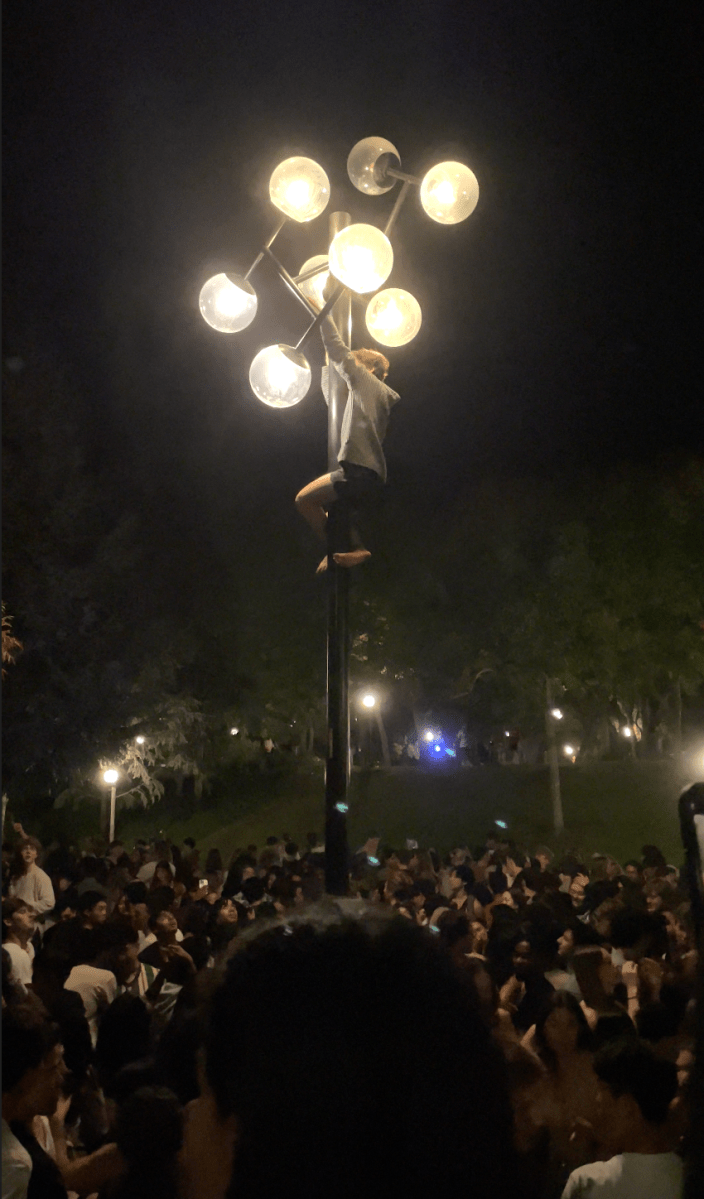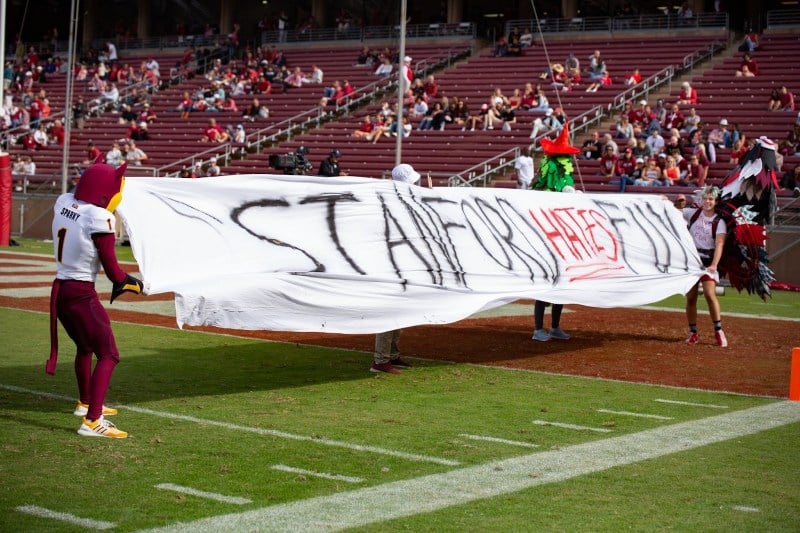On the first Friday of the academic year, a group of students wandered aimlessly through campus, cutting the silence with music played from a portable speaker.
They took turns climbing lamp posts and pushed shopping carts filled with beer through Main Quad. One wore a shirt emblazoned with “Stanford Hates Fun” written in red marker. This was, perhaps, what passed for fun after unclear instructions from University administrators forced the Kappa Sigma fraternity to postpone its annual Eurotrash event, typically the first all-campus party of the year.
In a normal year, the postponement of a single party would not be cause for alarm. But to some frustrated students, the delay was yet another example of University pressure to restrict student social life. Across more than a dozen interviews with The Daily, students alleged that Stanford has exerted pressure through its policies, lack of communication and adversarial approach to party registration and funding.
The University, on the other hand, has maintained that it has worked to provide social opportunities for students during this academic year, the first in two years free of widespread pandemic restrictions.
But a University spokesperson broadly declined to comment on specific allegations raised by students for this article, and numbers provided by the spokesperson indicate that the number of social events on campus has fallen sharply.
There were just 45 parties registered on campus during the first four weeks of the fall quarter, compared with 158 in the same period in 2019, according to Student Affairs spokesperson Pat Harris.
Student concerns are also not going away: one month after Eurotrash was postponed, four students, including mascots from both Stanford and Arizona State University, walked a 40-foot banner with the same “Stanford Hates Fun” slogan into the middle of a football game during Reunion Homecoming.
Without alternatives, students and safety advocates warned that dangerous decision-making, including solitary drinking or rebellious adventures such as pole-climbing, is on the rise.

Freshmen this year describe wandering campus Friday and Saturday nights in search of an open party or even trekking to San Jose State University in search of social engagement. Where music and loud laughter once were prevalent, weekends are often much quieter.
Moritz Stephan ’24, president of the Sigma Nu (SNU) fraternity, said communication with the administration about hosting social events for non-members broke down in the months leading up to the new school year.
“There was no guidance to any organizations about what the rules were going to be for this quarter until the Friday of the first week of classes, which is crazy,” he said.
Stephan said he and other Greek life leaders reached out to administrators repeatedly asking for guidance.
In addition to the lack of communication, Stephan charged that the administration’s policies on social life and the resulting lack of options have led the existing parties to be dangerously overcrowded.
“When you do host [parties], there are just way too many people,” Stephan said. “Last year, there were a couple where 600 to 800 [underclassmen were] trying to storm into our house, breaking through windows, physically and verbally assaulting members doing door security. And we just had to call the police on ourselves to, like, get everything cleared out.”
Harris declined to comment on the allegations that the University did not provide adequate and timely guidance, and on the threat posed by overcrowded parties.
Students interviewed said discontent about campus social life has been on the rise since last winter, but discourse was kicked into high gear in the spring when San Francisco magazine Palladium published an article called “Stanford’s War on Social Life” written by then-senior Ginevra Davis. (A derivative of that article’s title, the “war on fun,” was a term used by multiple students to refer to the University’s approach to social events.)
Though the article drew some criticism for its portrayal of Greek life as an innocent actor in the University’s alleged “war on fun,” the article also galvanized outrage over the steady decline of spontaneity. The piece was followed by other student articles in campus publications, including an op-ed earlier this month in The Stanford Review titled “Take Stanford Back: A Call to Revitalize Fun.”
Arman Sharma ’24, author of the Review op-ed, said he wrote his piece in response to “dead silent” bike rides home on weekend nights. He said his friends in the Kappa Alpha (KA) fraternity told him “about the bureaucratic nightmare that they had to go through to get [the annual KAbo party] approved. And I was like, this doesn’t really make sense for a college campus. [One] like this, in particular, that has been known as America’s dream school for a very long time.”
Complaints have spread beyond the initial concentration of those in or around Greek life circles — according to several students, a marked decline in social events of all types has swept Stanford as a direct result of actions taken by the administration.
One Voluntary Student Organization leader, who requested anonymity because much of the group’s funding is supplied by the office they criticized, said, “You feel like you’re being audited by the IRS to get boba for people.”
The student said the University is “excessively bureaucratic” and those trying to host events are “burnt out” from trying to navigate a ruleset that “has expanded and [adds] challenges that don’t need to be there.”
Harris, who also responded on behalf of the Office of Student Engagement, wrote that the University has worked to expand social opportunities. “Student Affairs, student leaders, and campus partners have been working earnestly to provide many and vibrant social options for undergraduates this fall,” Harris wrote.
“We now have funds specifically earmarked to support all Row houses, Greek and non-Greek, in hosting all-neighborhood or all-campus events,” Harris added.
But some students alleged that programs like Cardinal Nights have not been funded and advertised enough to serve as real alternatives, especially since they have been actively hampered by changing school policies. (Cardinal Nights disappeared in September 2021 after a departmental reshuffling, though it has returned under new management.)
And other efforts have proven ineffective. In April 2022, the University created a Student Social Life Accelerator Task Force, claiming “Stanford has long been known for its fun, irreverent, whimsical social scene. Yet it just hasn’t felt as vibrant as it could be.” According to students, the task force has failed to make progress. (The co-chairs of the task force did not respond to a request for comment.)
Other policies have also served as cause for concern among some in the student body, including changes to the alcohol policy in May 2021. Multiple members of residential staff said that the changes reversed a previous “open door” understanding, where students who were underage could drink in their rooms under supervision from their residential staff.
The Daily spoke with three employees of the Office of Substance Use Programs Education & Resources (SUPER) who requested anonymity after supervisors warned staff against communicating with reporters, according to emails provided to The Daily.
One employee characterized the new alcohol policy as “hopelessly out of touch with reality” and “absolute s**t.” Students interviewed agreed, broadly characterizing it as an unhelpful, adversarial system.
One Resident Assistant (RA), who requested anonymity because of an Office of Residential Education policy preventing RAs from speaking with reporters, explained that “a lot of [Resident Fellows] in the neighborhood have said, ‘This is the University’s policy on alcohol and drugs, let’s make our own policy.’ [They] are telling us, don’t worry about half of this stuff.” When asked about RFs disavowing University alcohol policy, Harris declined to comment.
Another RA vented that “people are still drinking, their doors are just closed. And that leads to people who are drinking for the first time who don’t know their limits,” whom RAs can’t help.
Many students echoed the danger they felt this policy caused students.
A 5-SURE on Foot employee, who requested anonymity in fear of retaliation from superiors, said the new alcohol policy “made our job a lot worse. I’ve seen firsthand the side effects of that which are, like, really catastrophic. Last year and this year I’ve seen people extremely drunk, some slipping on the verge of alcohol poisoning, just on their own” because they don’t have safer alternatives.
Stephan shares this concern for underclassmen. “I’m of age,” Stephan said. “I just went to San Francisco with my friends. And the number of freshmen that I saw there — girls by themselves, trying to get into crappy bars in bad areas with fake IDs — was just scary.”
When approached with these concerns about the alcohol policy, Harris declined to comment, and Dean of Students Mona Hicks did not respond to a request for comment.
***
Eurotrash eventually did take place at the end of Week 2, but the party was shut down at 11 p.m. after a student was taken to the hospital.
The first major all-campus party was held the third week of the quarter at Sigma Phi Epsilon (SigEp).
Leo Rossitter ’25, a sober monitor at the party which left little room for dancing much less for conversation, said, “Social definitely has a lot more headaches now. The University is putting up barriers [that] are unnecessary.”
When asked why, he said he “[couldn’t] speak to that.”
Rossitter’s restraint was echoed by a number of other sources. More than 30 students involved in campus social life and employees involved in alcohol and social life policy declined to be interviewed, fearing retribution for being associated with criticisms of the University.
When asked whether they would be comfortable with including some of their anodyne quotes in this article with attribution, the club leader whose funds come from the University said: “Ah, sorry, but the perception would be terrible if I’m associated in any way.”
Other sources were similarly skittish. Claudio Aguilar ’24, the president of SigEp who had agreed to an on-the-record interview, stood up and walked out of an interview after being told he couldn’t review the article in advance, which is The Daily’s policy.
Some of their concerns were not unfounded. When the University learned that a SUPER employee had spoken with The Daily for this article, Joe Kaczorowski, assistant director at SUPER, emailed 5-SURE student-workers telling them any conversations with the media “need to be cleared by me first.”
The Daily reviewed materials and policies from the SUPER office extending back several years and could not find records of such a policy. When asked where this policy had appeared in writing previously, Kaczorowski declined to comment.
Stephan said that with the current administration, “We have to be hyper-cautious. [It’s] a big reason why almost all Greek parties aren’t open to everyone anymore; we have to control the risk and control the liability.”
The alternative to this tiptoeing, he said, is clear: Last spring, all on the same day, the administration “sent basically every Greek org an investigation letter.” Over the summer, they hired outside lawyers to investigate the fraternities for their various potential transgressions.
The night of the SigEp party, DJs shut off the music at around 12:34 a.m., a strategy several brothers described as an attempt to get the freshmen to leave.
Jack Givhan ’25 summed it up in an interview at the party.
“This is the only thing going on tonight.”
